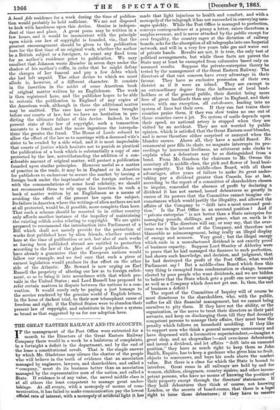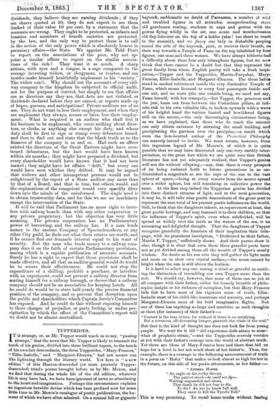THE GREAT EASTERN RAILWAY AND ITS ACCOUNTS.
Ir the management of the Post Office were entrusted for a month to the Directors of the Great Eastern Railway Company there would in a week be a hailstorm of complaints, in a fortnight a deficit in the department, and by the end of the lease a constitutional revolt. That is the simple answer by which Mr. Gladstone may 'silence the chatter of the people who will believe in the teeth of evidence that an association managed by engineers, lawyers, and shareholders, and called a "company," must do its business better than an association managed by the representative men of the nation, and called a State. If evidence is of any value, the sacred middle class is of all others the least competent to manage great under- takings. At all events, with a monopoly of means of com- munication, it has failed to make communication pay the lowest official rate of interest, with a monopoly Of artificial light it has made that light injurious to health and comfort, and with a monopoly of the telegraphithas not succeeded in conveying mee- sages quickly. While the Post Office is managed to perfection, conveys correspondence at a penny a letter, raises therefrom a surplus revenue, and is never attacked by the public except for over frugality, the country rages at the dictation of railway boards asks for the absorption of all telegraphs into one Imperial network, and will in a very few years take gas and water out of private hands. Results are not, it is true, the only test of political arrangements, but while these facts are patent the State may at least be exempted from calumnies based only on assumed results. Suppose the private-enterprise theory be tested by the management of the Great Eastern Railway. The directors of that vast concern have every advantage in their favour. They have as exclusive possession of their own district as if it were an island. They are exempt to an extraordinary degree from the influence of local land- holders or of the general public, their district being more free of great landlords than any other in England, and their routes, with one exception, all cul-de-sacs, leading into no system of lines but their own. If they run fast trains their counties praise them, if they run slow trains no one out of those counties cares a jot. No system of mails depends upon their speed, no national artery is stopped when they are visited by an accident. They are not worried by public opinion, which is satisfied that the Great Eastern must blunder, and is never therefore either surprised or annoyed when the blunder occurs. Above all, they have a model Board. No ornamental peer fills its chair, no magnate interrupts its pro- ceedings by irreverent liveliness, no aristocrat asks clerks to explain what a debenture may be as distinguished from a bond. From Mr. Goodson the chairman to Mr. Owens the secretary all is middle class, the pick and flower of local busi- ness capacity. Yet this middle-class Board, with all these advantages, after years of failure to make its great under- taking pay a dividend greater than Consols, has at last, according to the report of a committee of shareholders chosen to inquire, concealed the absence of profit by declaring a dividend it has not earned, issued debentures so greatly in. excess of its powers that the Committee cannot imagine cir- cumstances which would justify the illegality, and allowed the affairs of the Company to "drift into a most unsound posi- tion." Is the Post Office in an unsound position And if "private enterprise" is not better than a State enterprise for managing pounds, shillings, and pence, what on earth is it better for ? The directors will say, or may say, that the over- issue was in the interest of the Company, and therefore not blameable as mismanagement, being really an illegal display of energy and acumen. Very good ; but the illegal energy which ends in a manufactured dividend is not exactly proof of business capacity. Suppose Lord Stanley of Alderley were to prove that he had managed the finances to such perfection, had shown such knowledge, and decision, and judgment, that he had destroyed the profit of the Post Office, what would Parliament say ? But a middle-class Board which does this very thing is exempted from condemnation or change, because elected by poor people who want dividends, and we are bidden to believe that the State which gets a profit can never manage as well as a Company which does not get one. Is, then, the end of business a deficit The report of the Committee of Inquiry will of course be most disastrous to the shareholders, who, with the public, suffer for all this financial management, but we cannot bring ourselves to pity them. If they have not the ability, or the organization, or the nerve to treat their directors as their paid servants, and keep on discharging them till they find decently competent persons to manage their affairs, they must bear the penalty which follows on household muddling. If they like to support men who think a general manager unnecessary and have dispensed with a locomotive superintendent,—imagine_ a great shop, and no shopwalker 1—and over-issue debentures, and invent a dividend, and let affairs "drift into an unsound position," they have as much right to keep them as John Smith, Esquire, has to keep a gardener who gives him no fruit, objects to scarecrows, and buys his seeds above the market value. But there is a class for which the State is bound to interfere. Great sums in all railways are held by and' for women, children, clergymen, country squires, and other incom- petent persons, who have no means of knowing the position of their property except -through the directors' statements. If they hold debentures they think of course, not knowing London, or the secrets of board-rooms, that there is a legal light to issue those debentures; if they have to receive dividends, they believe they are earning dividends ; if they see shares quoted at 50, they do not expect to see them docked of their value 10 per cent. by a statement that the accounts are wrong. They ought to be protected, as infants and lunatics and members of benefit societies are protected, by the law, and the only way to protect them is to call in the action of the only power which is absolutely honest in pecuniary affairs—the State. We appoint Mr. Tidd Pratt to report on the associations of the poor, why not ap- point a similar officer to report on the similar associa- tions of the rich ? They want it as much. A sharp artizan, with eyes and a tongue, is a sage compared to the average investing widow, or clergyman, or trustee, and can besides make himself healthfully unpleasant to his "society." The widow can't. Why should not the accounts of every rail- way company in the kingdom be subjected to official audit, not for the purpose of control, but simply to see that affairs are as directors say they are, that Acts are not violated, or dividends declared before they are earned, or reports made up of hopes, guesses, and anticipations? Private auditors are of no use. They do not want to lose their employment, and when they are unpleasant they always, sooner or later, lose their employ- ment, What is required is an auditor who shall feel it his business to be unpleasant, who cares nothing about direc- tors, or clerks, or anything else except his duty, and whose duty shall be first to sign or stamp every debenture issued, and then to find out and state that the blank truth as to the finances of the company is so and so. Had such an officer existed the directors of the Great Eastern might have over- issued debentures, but the fact would have been known within six months ; they might have prepared a dividend, but every shareholder would have known that it had not been earned ; they might have let affairs "drift," but every one would have seen whither they drifted. It may be argued that widows and other incompetent persons would not be enlightened by the report of a State auditor any more than by that of a Board, and that is true, but others would, and the explanations of the competent would very speedily filter down into the minds of the uninformed. The single need is to obtain trustworthy data, and for this we see no machinery except the intervention of the State.
It will be said that Parliament has no more right to inter- fere with railway boards than with any other corporation or any private proprietary, but the objection has very little meaning. The private corporation has no Parliamentary power of borrowing, and the railway has. If a man lends money to the ancient Company of Spectaclemakers, or any other City guild, he finds out what their estates are worth, and if he cannot find out demands interest equal to his want of security. But the man who lends money to a railway com- pany does it on the faith of certain Parliamentary provisions, among which is a regular publication of accurate accounts. Surely he has a right to expect that those provisions shall be made effective, and all that an auditor-general would do would be to secure their effectiveness. He could not stop the expenditure of a shilling, prohibit a purchase, or interfere with an experiment, could not prevent a railway director from seating himself for a railway borough, or decree that a railway company should not be an association for keeping hotels. All he could do would be to state half-yearly the precise financial position of the company, and so prevent that deception upon the public and shareholders which Captain Jervis's Committee has exposed. And he could do this without exposing himself to those charges of prejudice, or party feeling, or undue pre- cipitation by which the effect of the Committee's report will we doubt not be almost neutralized.



































 Previous page
Previous page